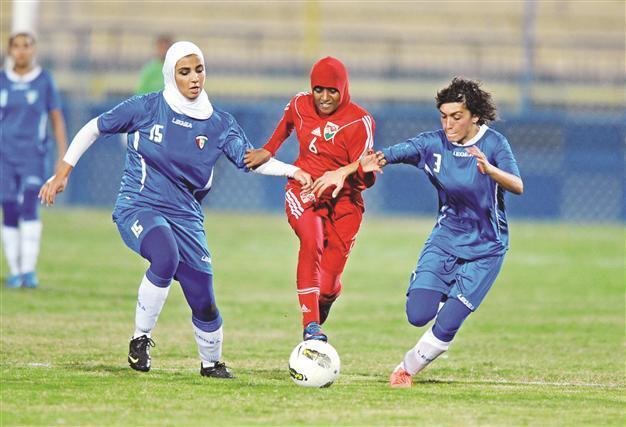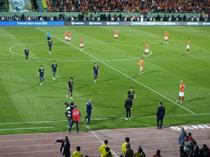Middle Eastern football federations campaign for women’s right to play
James M. Dorsey

In this file photo from Nov 24, 2012, Kuwait national women’s players Zainab Mansoor (L) and Marwa Khalid (R) vie for the ball with Maldives’ player Fatima Shaleh during a friendly match in Kuwait. AP photo
Middle Eastern football associations have launched a campaign to put women’s games on par with men’s football in a region where a woman’s right to play or pursue an athletic career remain controversial and political Islam is on the rise.The associations announced the campaign at the end of a two-day seminar in the Jordanian capital of Amman that was organized by the West Asian Football Federation (WAFF) and the Asian Football Development Project (AFDP). Glaringly absent among the representatives of the 13 Middle Eastern WAFF members was Saudi Arabia, where women’s football exists at best in a political and legal never-never land with Yemen’s.
The campaign comes as women demand greater rights in a part of the world that has entered a period of dramatic political and social change. Popular revolts in the past two years have toppled the autocratic leaders of Tunisia, Egypt, Libya and Yemen, sparked a bloody civil war in Syria and prompted numerous other states to adopt policies designed to shield themselves against a wave of protest that are unlikely to leave any Middle Eastern nation untouched.
A statement made at the end of the seminar, which was chaired by the International Federation of Association Football (FIFA) Vice President and AFDP Chairman Prince Ali Bin Al Hussein, defined an athletic woman as “an empowered woman who further empowers her community.” In a rebuttal to the opposition women’s football has faced from some Islamists across the region and more conservative segments of Middle Eastern society the seminar stressed that women’s football did not demean cultural and traditional values.
Empowering community
In doing so, the associations backed by representatives of the United Nations, the Union of European Football Associations (UEFA), the Asian Football Confederation (AFC), and the English Football Association put themselves at the forefront of efforts to secure equality and women’s rights. The seminar’s statement emphasized the right of women to play football irrespective of culture, religion and race; a women’s right to opt for football as a career rather than as only a sport; and football’s ability to promote gender equality and level the playing field on and off the pitch.
The statement called further for the appointment of women to the boards of WAFF member associations, the establishment of a WAFF women’s committee, the creation of Under-16 and Under-19 women competitions in the Middle East (West Asia) as well as the compulsory rotation of hosting of subsidized WAFF women competitions.
With Saudi Arabia unlikely to comply with the initiative, It was not immediately clear whether member associations who refused to participate would be sanctioned, and if so, how. The statement, however, singled out Saudi Arabia by explicitly stating that the kingdom would be included in women’s tournaments. The statement said it would kick start its campaign with a WAFF Girls Football Festival on March 8, International Women’s Day.
In campaigning for women’s rights, WAFF has its work cut out for it not only with regard to Saudi Arabia, but also in relation to many of its members who did sign on to the focus on women. “Female athletes in the Middle East face pressures that include family, religion, politics and culture,” said a recent study entitled “Muslim Female Athletes and the Hijab” by Geoff Harkness, a sociologist at Northwestern University’s Qatar campus. Samira Islam, one of Harkness’ basketball playing students assisted with the study.
Last year, Human Rights Watch accused Saudi Arabia of kowtowing to assertions from the country’s powerful conservative Muslim clerics that female sports constitute “steps of the devil” that will encourage immorality and reduce women’s chances of meeting the requirements for marriage. The group’s charges contained in a report entitled “Steps of the Devil” came on the heels of the kingdom backtracking on a plan to build its first stadium. The stadium was especially designed to allow women, who are currently barred from attending football matches due to the kingdom’s strict public gender segregation, to watch games. The planned stadium was supposed to open in 2014.
Saudi Arabia, which does not have physical education for girls in schools and has hired consultants to draft its first ever five-year national sports plan designated for men only, bowed to pressure last year to field female athletes at the London Olympics. It was the first time the country ever entered female athletes at an international competition. It did so by fielding two expatriate Saudi females.
Women nonetheless play an important role in sporadic anti-government protests in Saudi Arabia, a country where discontent is simmering on the surface. Authorities earlier this month arrested 18 women in Buraida, a bulwark of Wahhabism, Saudi Arabia’s puritan interpretation of Islam, who were protesting the long-term detention of relatives without charges on suspicion of terrorism.
No female supporters
Women in Iran have the right to play provided their uniforms are compliant with Islamic precepts. However, just as in Saudi Arabia, women in Iran are also barred from attending matches as spectators in all-men stadiums. For their part, Kuwaiti Islamists denounced the Gulf University for Science and Technology’s organization of a football tournament for Gulf women teams. “Women playing football is unacceptable and contrary to human nature and good customs. The government has to step in and drop the tournament,” Kuwait’s Al Wasat newspaper quoted Parliament member Waleed al-Tabtabai as saying at the time. “Football is not meant for women, anyway,” he said.
Prince Ali has, however, put conservatives on the defensive with his successful campaign last year to get FIFA to agree to observant Muslim football players wearing a headdress that complies with Islamic precepts as well as the world football body’s safety and security standards. The move set the stage for the WAFF campaign by taking away one major obstacle to women’s sports having the same status of the athletic endeavors of men.
















